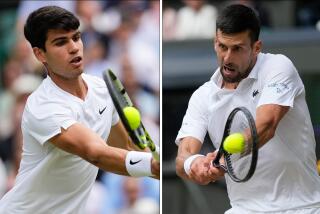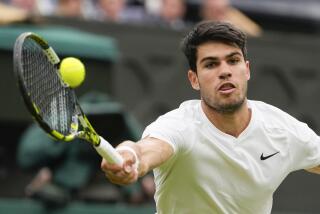Tennis / Lisa Dillman : Even 25 Years Later, Laver Is the One to Ask About Wimbledon
- Share via
Even while Rod Laver was making a strong endorsement of Boris Becker’s chances for a third straight Wimbledon title, he was astute enough to throw in a note of caution.
“He plays his best tennis at Wimbledon,” Laver said Wednesday from his Newport Beach office. “And it’s unusual to see someone take to Wimbledon like he does. It’s like a duck taking to water. He and Wimbledon go hand in hand. That’s tough for any player going against him. . . . It’s almost like Becker has a 15-0 lead before he starts each game.
Laver laughed.
“There’s a danger of doing this,” he said. “He could be losing right now as we’re talking. He could fall flat on his face. It might be windy or slippery out there for one of his matches.”
Just two days later, Becker fell right out of the tournament, losing to little-known Peter Doohan of Australia in the second round.
Among the other names Laver tossed out for consideration were Sweden’s Stefan Edberg and Ivan Lendl.
“Lendl is capable of playing very well,” Laver said. “It’s tough for him to get a good footing on grass that he likes and that’s what you don’t get on grass. Someone like Lendl will be tough to beat. He has a good chance.
“I feel Edberg is one of the real dark-horses if he gets some rhythm going. He has a good coach in Tony Pickard, who has him on the right track.”
Lately, men’s tennis has come under attack for its lack of excitement. The debate became more animated after watching Lendl and Mats Wilander exchange moonballs from the base line in the French Open men’s final. Laver feels that match was an exception, saying that if a Becker or John McEnroe had reached the final, the strategy obviously would have been much different.
“I can’t do that,” Laver said of the long base line rallies. “I wouldn’t have wanted to do that, it wasn’t my makeup. It is boring all the same, but that’s being very critical. Tennis aficionados say, ‘What is this?’ Some of the points took 50 to 60 hits. I wouldn’t even do that in a whole match.”
This year is the 25th anniversary of Laver’s first Grand Slam. In all, Laver won 19 of 34 tournaments and 134 of 149 matches in 1962. Seven years later, he duplicated the accomplishment as a professional.
In 1962, Laver won three of the four Grand Slam stops on grass--the other came on clay at the French Open. Now, however, there are several factors that make a Grand Slam more difficult.
“It’s not too probable,” Laver said. “Most times, the depth in competition is so much greater. We had good quality players in my day, but it is nowhere near where it is today. You don’t get an easy match, except for Stefan Edberg, in the first round. (Edberg defeated Stefan Eriksson, 6-0, 6-0, 6-0, in the opening round).
“When I did it, I played on three grass and one clay. Now, it’s four different surfaces because the Australian changed from grass. I have to feel in my mind, it’s much more difficult.”
Laver gives Lendl credit for changing his mental approach to Wimbledon. Earlier in his career, Lendl disliked the tournament and even skipped it once, saying he was “allergic to grass.”
Laver: “I take my hat off to him that he’s doing it, getting into the net now. He wants to win Wimbledon. And I think it’s a great benefit for him to have been in the (1986) final. There is such an advantage compared to someone like Chris Lewis, who made it a few years ago. He was just overwhelmed. There’s a great deal of knowledge to be learned. It’s not the same as any other tournament.”
Add Lendl: Indeed, Lendl is making an effort to change. The on-court reversal--from a stubborn base liner to an opportunistic net rusher--paid off when he won his first U.S. Open title in 1985. And now, almost two years later, he has earned respect from the majority of American journalists.
Twenty-five years ago, the women’s final featured two surprise finalists. American Karen Hantze, 19, won the title with a 6-4, 6-4 victory over unseeded Vera Sukova of Czechoslovakia. Sukova had defeated defending champion Angela Mortimer, Darlene Hard and Maria Bueno.
Hantze (now Karen Hantze Susman), who lives in La Jolla, isn’t at Wimbledon this year to celebrate the 25th anniversary of her championship, and Sukova died several years ago. This year, though, it’s somehow fitting that Sukova’s daughter, Helena, has an excellent chance to equal, or better, her mother’s tournament performance.
The evidence: Helena Sukova’s showing in the final Wimbledon warmup tournament at the seaside town of Eastbourne. She beat Chris Evert in the quarterfinals and rallied from a 0-5 first-set deficit to defeat Martina Navratilova, 7-6, 6-3, in the final.
More evidence: Sukova has the ability to come up strong on the big occasions, such as when she halted Navratilova’s 74-match winning streak at the Australian Open in 1974. Sukova’s task won’t be easy as No. 2-seeded Steffi Graf is in the same half of the draw. But Sukova’s recent performance and the 25th anniversary of her mother’s appearance in the final might be enough against higher-ranked players.
Tennis Notes
The Southern California Tennis Assn. will hold clinics for children at various locations, starting the week of July 6. The program, for players between the ages of 8 and 18, is organized by the National Junior Tennis League and will be held at 75 locations throughout Southern California. For more information, call the Southern California Tennis Assn. at (213) 208-3838.
More to Read
Go beyond the scoreboard
Get the latest on L.A.'s teams in the daily Sports Report newsletter.
You may occasionally receive promotional content from the Los Angeles Times.










